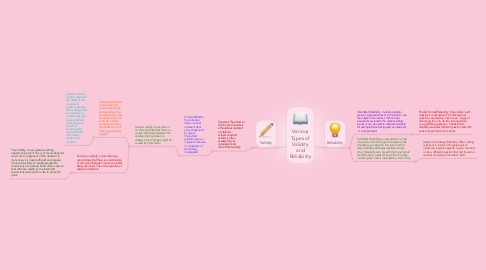
1. Validity
1.1. Construct:The extent to which a test measures a theoretical construct or attribute. A test’s construct validity is often assessed by its convergent and discriminant validity.
1.1.1. Content:Whether the individual items of a test represent what you actually want to assess. The perfect question gives a complete measure of all aspects of what being investigated
1.1.1.1. Internal: validity occurs when it can be concluded that there is a causal reltionship beteween the variables being studied. A danger is that changes might be caused by other factor
1.1.1.1.1. External validity: this occurs when the causal relationship discovered can be generalized to other students, times and contexts. Correct sampling will allow generalization and hence give external validity.
1.1.1.1.2. Conclusion validity: occurs when you can conclude that there is a relationship of some kind between the two variables being examined. This can be positive or negative correlation
2. Reliability
2.1. Inter-Rater Reliability: multiple students are giving assessments of some kind or are the subject of some test, them similar people shoud lead to the same resulting scores. It cna be used to calibrate students, for example those being used as observers in an experiment.
2.1.1. Parallel Formed Reliability: One problem with questions or assessment in knowing what questions are the bes ones to ask. A way of dicovering this is to do two test inparallel, using differing questions. Parallel-forms reliability evaluates different question sets that seek to asses the same contruct.
2.2. Test-Retest Reliability: an assessment or test of a person should be give the same results whenever you apply the the test. Test the retest reliablitiy evaluates reliability across time. Reliability can vary with the many factors that affect how a person respond to the test, including their mood, interruptions, time of day
2.2.1. Internal Consistency Reliability: Whe n asking questions in research, the purpose is to assess the response agianst a given construct or idea. Different question that test the same contruct should give consistent result
